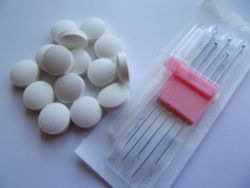
Researchers carrying out a systematic review of clinical trials on acupuncture for post-traumatic stress disorder, have found promising evidence for its effectiveness. Four randomised, controlled trials and two uncontrolled trials were included in the review.
– One high quality randomised, controlled trial found that acupuncture was superior to waiting list control, and similar in effect size to cognitive behavioural therapy (CBT).
– One randomised, controlled trial showed acupuncture and SSRI anti-depressants to be equal in effect.
– One randomised, controlled trial found acupuncture in conjunction with CBT was more useful than CBT alone.
Where SSRI anti-depressant therapy is concerned, the researchers point out that during long-term SSRI therapy, the most troubling adverse effects can include sexual dysfunction (2 to 7% of patients), weight gain (average 10.8 kg for paroxetine), and sleep disturbance. Conversely, for acupuncture, mild adverse events such as bleeding and bruising, occurred at a rate of 6.8% (2,178 out of 31,822 sessions). According to two studies, no serious adverse events were reported in a total of 66,229 acupuncture sessions. Therefore for long-term therapy, acupuncture may be a relatively safe alternative to SSRIs.
(Acupuncture for Posttraumatic Stress Disorder: A Systematic Review of Randomized Controlled Trials & Prospective Clinical Trials. Evidence-Based Complementary & Alternative Medicine, 2013.)
 A systematic review of complementary medical treatments, carried out by researchers at Oregon Health and Science University in the USA, has shown acupuncture can alleviate the symptoms of post-traumatic stress disorder (PTSD). They assessed 33 studies looking into the effects of various therapies on PTSD, and concluded there was good evidence for the usefulness of acupuncture, hypnotherapy, meditation and visualisation.
A systematic review of complementary medical treatments, carried out by researchers at Oregon Health and Science University in the USA, has shown acupuncture can alleviate the symptoms of post-traumatic stress disorder (PTSD). They assessed 33 studies looking into the effects of various therapies on PTSD, and concluded there was good evidence for the usefulness of acupuncture, hypnotherapy, meditation and visualisation. 


 A study of Chinese earthquake victims suggests that electroacupuncture is more effective than anti-depressants for treating the symptoms of post-traumatic stress disorder (PTSD). Researchers identified 138 people who were suffering symptoms as a result of experiencing a magnitude 8.0 earthquake on the Richter scale, in May 2008. They randomly allocated people to receive either electroacupuncture treatment or anti-depressant medication (paroxetine). After treatment, both groups reported reduced symptoms, but the improvements in the electroacupuncture group were significantly greater, at all time points in follow-up to six months.
A study of Chinese earthquake victims suggests that electroacupuncture is more effective than anti-depressants for treating the symptoms of post-traumatic stress disorder (PTSD). Researchers identified 138 people who were suffering symptoms as a result of experiencing a magnitude 8.0 earthquake on the Richter scale, in May 2008. They randomly allocated people to receive either electroacupuncture treatment or anti-depressant medication (paroxetine). After treatment, both groups reported reduced symptoms, but the improvements in the electroacupuncture group were significantly greater, at all time points in follow-up to six months.